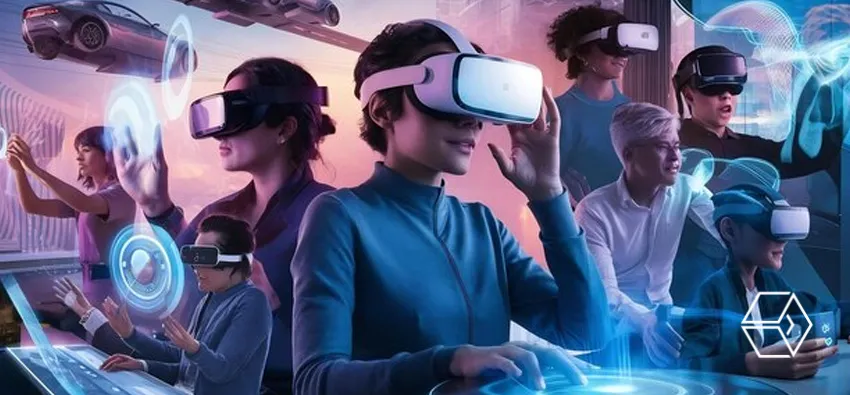
Meta, previously recognized as Facebook, is a tech giant that encompasses platforms and services like social networking, augmented reality (AR), virtual reality (VR), and artificial intelligence (AI). Within the VR domain, Meta shines through its branch Oculus, which it acquired back in 2014. Oculus is renowned for its VR gadgets, such as the Oculus Rift and Oculus Quest headsets, which offer vivid gaming experiences, virtual social interactions, and other diverse applications for education, training, and more.
Meta has been actively investing in VR technology by developing content and establishing infrastructure to expand its presence in the realm of virtual reality since 2020.
Meta’s VR Strategy Shift
Meta has made immense progress in the VR arena. In late 2022, Meta introduced its ‘Mixed Reality’, which used important technologies in which mixed reality headsets and spatial anchors allowed virtual objects to occupy fixed spaces in the physical world, while scene understanding would be able to reconstruct physical spaces virtually.
Presently, Meta is forming strategic alliances with external hardware manufacturers such as Microsoft, Lenovo, and Asus in order to develop virtual reality headsets that utilize the Meta Horizon operating system. The new hardware devices will run on the same operating system and software as Meta’s first-party virtual reality hardware, such as the Quest 3 and Quest Pro.
This move will give Meta a strategic and competitive advantage that defines the fault lines of the virtual reality hardware market, as Apple’s VR product will compete against a range of different hardware devices running on Meta’s operating system.
Mark Zuckerberg desires his organization to operate as a more transparent platform in comparison to Apple. Apple has had a closed ecosystem ever since its inception. This has divided the market into two distinct divisions: iOS users and Android users. Meta has long been at odds with Apple’s regulations for its App Store.
Zuckerberg has mentioned a couple of times that the company is working on creating a cutting-edge virtual and augmented reality platform with a store controlled by Meta.
The tech powerhouse is also pushing for more ways to discover alternative app stores and has invited Google’s Play Store to its HorizonOS, a major blow to Apple. This move aims to avoid Apple’s app rejections and fees and create VR products for a market that prefers an open ecosystem rather than a closed one.
Metas’ initiative to introduce an operating system platform is possible due to the major investments it has received over the years.
Potential Benefits
The shift between Meta’s users and Apple’s iOS users could have an impact on the adoption of VR technology. Meta’s emphasis on openness is sure to encourage innovation and empower developers to craft a range of experiences within the content that will drive participation and platform expansion.
On the other hand, Apple’s closed system restricts flexibility, possibly hindering creativity and limiting access to content. With VR becoming more popular as time passes, Meta’s inclusive approach may attract an audience and gain support from the developer community.
Nevertheless, Apple’s dedicated user base and cohesive ecosystem may still resonate with their ‘loyal’ demographics, ensuring competition in the changing VR landscape.
Questions and Considerations
Given that Metas HorizonOS is an emerging service, it may encounter several challenges. While simultaneously fostering an environment conducive to quality control and user contentment, Meta will need to do so immediately.
- It may be difficult to strike a balance between openness and platform governance in order to prevent misuse or the production of substandard content.
- Furthermore, the presence of an open ecosystem may lead to fragmentation in the virtual reality (VR) market, resulting in discrepancies in standards, compatibility challenges, and a wide range of user experiences across different platforms.
- Moving forward, Meta must effectively navigate these challenges in order to develop a VR environment that is captivating for both users and developers while maintaining the integrity of the platform.
Meta claims that by making its operating system available to hardware partners, it will be able to develop specialized hardware for niche markets, such as gaming, productivity, or even something designed for minimal weight. The objective is to reaffirm that the open model, which includes the metaverse, glasses, and headsets, characterizes the next iteration of computing.



